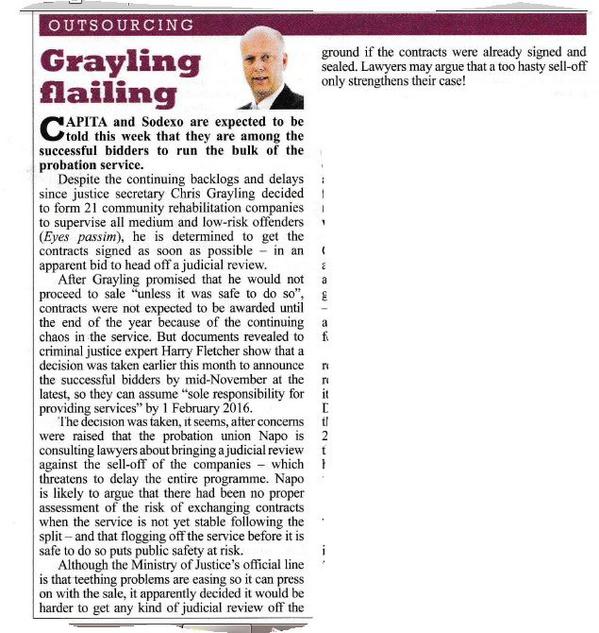To: Branch Chairs, Vice Chairs, Secretaries & Convenors
Family Court SEC (for info)
Cc: NEC Reps Napo Officers and Officials
Dear Colleague,
QUESTIONS:
1. What support are the CRC's currently providing to the NPS in terms of working across the divide, sessional work supervising cases/acting as duty etc? This is likely to vary around the country.
2. Access to nDelius and OASys records for CRC staff. The MOJ are denying that there is a problem with staff accessing records. In particular those in interventions. We need members in the CRC's to confirm if there is still a problem accessing records? How easy it is for NPS staff to allow access and if this is being done routinely? What information is available on the "front sheet" and how helpful is that to staff?
3. Further to above have any CRC managers seen the proposed extended front sheet due to be released in December? If so how helpful is this for CRC staff seeing NPS offenders in the absence of NPS staff being available?
4. Workloads - We need to gain a picture of what workloads are like across both the NPS and the CRC's. In particular workloads according to grade. Are PSO's still holding high risk cases? Are there examples of caseloads of 50+? TPO's holding complex cases above their training and experience?
5. Risk escalation process- The MOJ is asserting that very few CRC staff have needed to use the Risk Escalation Process implying that risk escalation is rare. Napo believes that at least 5% of offenders are subject to risk escalation during their sentence but we need evidence to support this. How often is the risk escalation process being used? How much more complex the process compared to processes prior to the 1st June?
URGENT REQUEST FOR INFORMATION FOR JUDICIAL REVIEW
Further to Napo's announcement to proceed with an application for Judicial Review, both Napo and our legal team are going through the Treasury Solicitors response and have identified areas where we require further information from the front line in order to challenge the MOJ on certain points. As such we urgently require the information outlined as attached. As much or as little detail as you are able to give would be extremely useful at this stage.
This is urgently required and we would ask Branches to try to respond by 5pm Monday 3rd November where possible to tbassett@napo.org.uk
BR 132/2014
URGENT REQUEST FOR INFORMATION FOR JUDICIAL REVIEW
Please try to respond by 5pm Monday 3rd November where possible to tbassett@napo.org.uk
1. What support are the CRC's currently providing to the NPS in terms of working across the divide, sessional work supervising cases/acting as duty etc? This is likely to vary around the country.
2. Access to nDelius and OASys records for CRC staff. The MOJ are denying that there is a problem with staff accessing records. In particular those in interventions. We need members in the CRC's to confirm if there is still a problem accessing records? How easy it is for NPS staff to allow access and if this is being done routinely? What information is available on the "front sheet" and how helpful is that to staff?
3. Further to above have any CRC managers seen the proposed extended front sheet due to be released in December? If so how helpful is this for CRC staff seeing NPS offenders in the absence of NPS staff being available?
4. Workloads - We need to gain a picture of what workloads are like across both the NPS and the CRC's. In particular workloads according to grade. Are PSO's still holding high risk cases? Are there examples of caseloads of 50+? TPO's holding complex cases above their training and experience?
5. Risk escalation process- The MOJ is asserting that very few CRC staff have needed to use the Risk Escalation Process implying that risk escalation is rare. Napo believes that at least 5% of offenders are subject to risk escalation during their sentence but we need evidence to support this. How often is the risk escalation process being used? How much more complex the process compared to processes prior to the 1st June?

